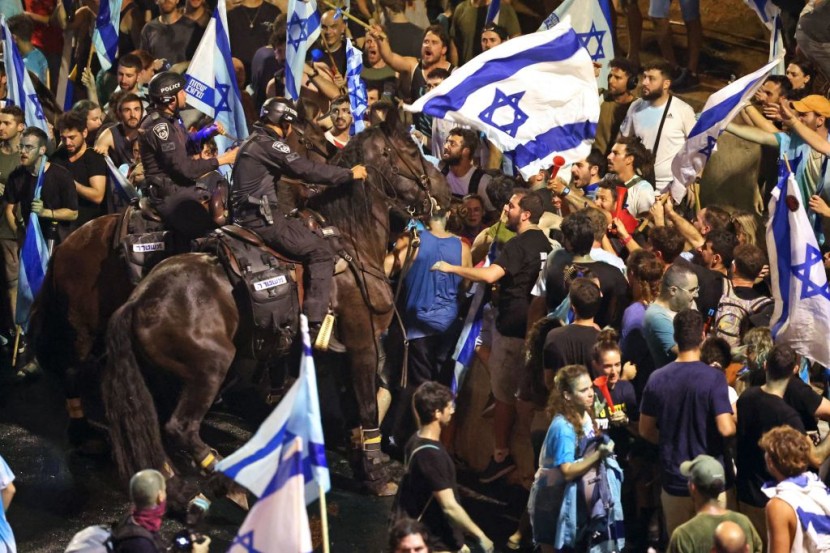
The Israeli police engaged in nighttime clashes with masses of demonstrators after the parliament passed a highly controversial law limiting the Supreme Court's authority.
The measure, which is part of a comprehensive reform program, will prevent the court from reversing government actions that it deems unreasonable.
Protesters Clash With Police Following Israel's Judicial Reform
The police in Jerusalem and Tel Aviv used water cannons to disperse highway-blocking demonstrators. According to critics, the government's reforms pose a threat to Israeli democracy.
After months of massive street demonstrations in opposition to the judicial reform, the reform was approved. The Knesset vote on Monday was a significant victory for Prime Minister Benjamin Netanyahu. But the conflict is not yet over. It could last for months.
A political watchdog group and opposition leader Yair Lapid will petition the Supreme Court to overturn the new legislation. Per BBC, thousands of military reservists, including air force pilots, have also pledged not to report for duty if the law is permitted to stand.
For a nation that takes pride in its ability to respond swiftly to any threat, the possibility that Israel's security could be compromised is a source of great concern. Netanyahu has insisted that the law is required for the government to "carry out policy in accordance with the majority of the country's citizens."
However, he stated that he would resume negotiations with the opposition until November to reach a comprehensive agreement. The proposed reforms have sparked some of the largest demonstrations in Israeli history. Monday saw at least 22 arrests, according to police.
The vote, which was passed unanimously by Netanyahu's governing coalition after the opposition stormed out of the chamber, deepened the fissures that have tested the delicate social ties that bind the country, shook the cohesion of its powerful military, and repeatedly drew concern from the United States, Israel's closest ally.
Thousands of flag-waving protesters were captured on camera, taking to the streets and obstructing highways as they marched to express their outrage over the passage of the law.
To disperse the protesters, Israel's security forces responded with water cannons. Others were observed throwing demonstrators to the ground and hauling them away from the masses, according to Daily Mail.
The government passed the controversial law after 29 weeks of widespread protests and public opposition. The legislation prohibits courts from reviewing the reasonability of government and ministerial decisions; it is the first significant measure to pass as part of Netanyahu's plan to overhaul the country's judiciary.
It occurred mere hours after Netanyahu, 73, was discharged from the hospital, where he had a pacemaker implanted, adding a disorienting variation to an already dramatic series of events.
As Netanyahu's allies celebrated their victory and promised to push forward with additional reforms, thousands of protesters took to the streets of Jerusalem and Tel Aviv, and opponents swore to challenge the new legislation before the Supreme Court.
Read Also : Canada Floods: State of Emergency Declared in Nova Scotia; Floodings Leave 2 Dead, 2 Missing
Wild Israeli Judicial Reform Protests Continue
Tel Aviv now! Pro-democracy protest in Israel. pic.twitter.com/DPmPvYxTqA
— Ashok (@ashoswai) July 15, 2023
Heartwarming moment! 🥲
— Rabbi Shmuel Reichman (@ShmuelReichman) July 24, 2023
This just happened in Israel, as protesters who are against the judicial overhaul head down the escalator and meet those who are protesting for the judicial overhaul heading up the escalator of a Jerusalem train station.
As Tisha B’Av is upon us, and we… pic.twitter.com/vu3KKNwyxD
A car drove through pro-democracy protesters in Israel, injuring 3 people. Remember India’s farmer protest and the son of Modi’s minister driving his Jeep over protesting farmers! Modi and Netanyahu’s supporters have a lot in common. pic.twitter.com/BEC5w9JRny
— Ashok (@ashoswai) July 24, 2023
Thousands of people, many of whom were brandishing blue-and-white Israeli flags, congregated in front of the Knesset, or parliament, and the Supreme Court and clogged the main highway in Jerusalem.
Walls and railings were covered in posters that read "we will not serve a dictator," "democracy or rebellion," and "save Israel from Netanyahu."
Many protestors stuffed cotton into their nostrils or clutched rosemary sprigs plucked from nearby shrubs in an effort to contain the stench.
Additionally, tens of thousands demonstrated in the heart of Tel Aviv, the epicenter of months of anti-government demonstrations. There were scuffles between police and demonstrators, with at least eight arrests and the igniting of bonfires by protesters.
Mounted police parted throngs as other officers grappled with demonstrators. A video depicted a man carrying an Israeli flag being blown off a wall by a water canon.
The police have reportedly apprehended the motorist who struck a group of demonstrators in central Israel, injuring three individuals. Local media broadcast footage of the vehicle driving into a small gathering on a highway blocked by demonstrators.
In response to the escalating crisis, former Israeli Prime Minister Ehud Olmert warned that the nation was descending into civil conflict. His remarks were reiterated by others outraged by the passage of the bill.
According to Netanyahu and his associates, the changes strengthened democracy by limiting the authority of unelected judges and expanding the decision-making authority of elected officials.
Protesters, however, view the reform as a power grab motivated by the personal and political grievances of Netanyahu, who is on trial for corruption, and his allies.
Related Article : Israel Passes Controversial Judicial Reform Law, Limits Supreme Court Power Despite Massive Opposition
© 2026 HNGN, All rights reserved. Do not reproduce without permission.








